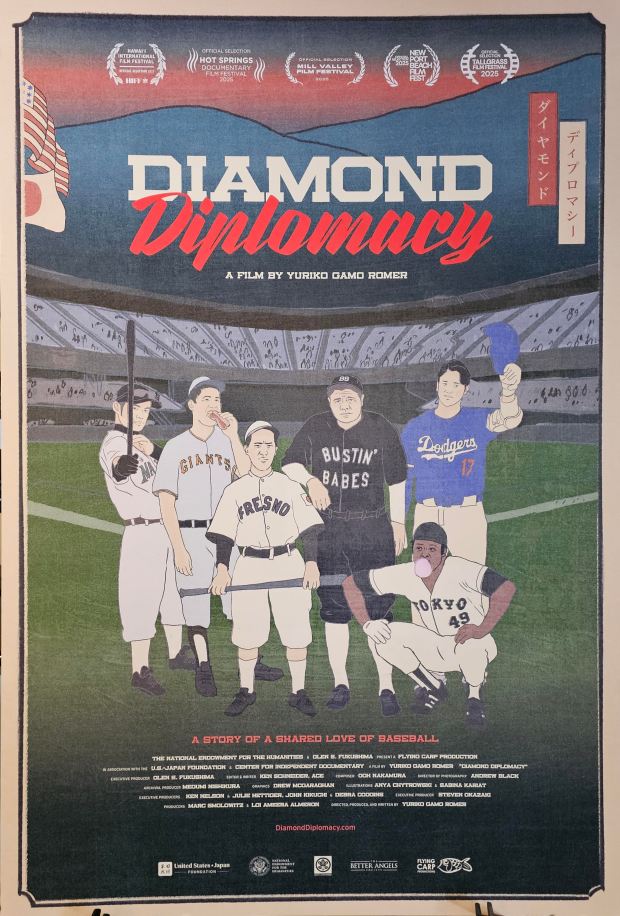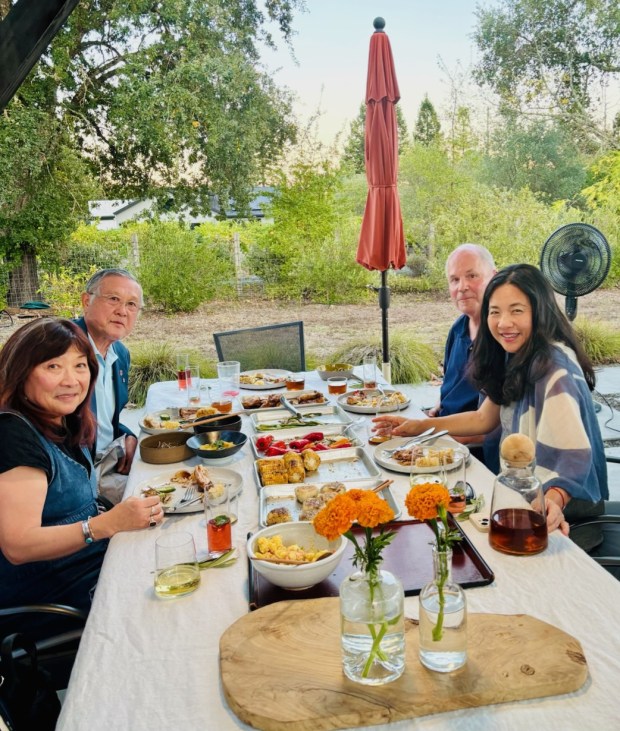As baseball fever piques with the imminent opening of the World Series featuring Los Angeles Dodgers Japanese superstar Shohei Ohtani, a new documentary film facilitated by a Sonoma couple focusing on U.S.-Japan relations through their shared love of baseball has been gaining acclaim at film festivals throughout the United States.
The film, “Diamond Diplomacy,” likely would never have been created without the help of Doug and Megumi Inouye, a Japanese American couple who moved to Sonoma in 2019. They are friends of both the film’s award-winning director, Yuriko Gamo Romer, and a former athlete it features, San Francisco Giants left-handed pitcher Masanori “Mashi” Murakami, who in 1964 became the first native Japanese to play in the U. S. major leagues.
Romer, Murakami and the Inouye couple attended the world premiere of the film at the Mill Valley Film Festival this month and then gathered for a Japanese dinner at the couple’s home in Sonoma two days later. Spirits ran high on both days, celebrating Murakami’s career as well as the successes in overcoming challenges in making the film and audiences’ appreciation of it.
The roots of the film date back to 1983, when Doug’s dad, Robert Inouye, was invited by Cap Kuno—his good friend as well as one of the official Giants’ photographers—to the team’s spring training in Phoenix, Arizona.
From left, Yuriko Gamo Romer, director of “Diamond Diplomacy,” a new documentary film focusing on U.S. Japan baseball relations, gathers with Megumi Inouye, former San Francisco Giants pitcher Masanori Murakami and Doug Inouye at the Inouyes’ home in Sonoma on Monday, Oct. 13, 2025. (Daniel Johnson)

A new docummentary film, “Diamond Diplomacy,” that focuses on U.S.-Japan baseball relations and their broader impacts, was facilitated by Sonoma couple Doug and Megumi Inouye. Photo taken at the world premiere of the film at the Mill Valley Film Festival on Friday, Oct. 10, 2025. (Daniel Johnson)

Doug Inouye
Yuriko Gamo Romer, director of the new baseball documentary film, “Diamond Diplomacy,” enjoys a Japanese dinner with former San Francisco Giants pitcher Masanori Murakami, Sonoma Index-Tribune staff writer Daniel Johnson and Megumi Inouye at the Inouye home in Sonoma on Monday, Oct. 13, 2025. (Doug Inouye)
Show Caption
1 of 3
From left, Yuriko Gamo Romer, director of “Diamond Diplomacy,” a new documentary film focusing on U.S. Japan baseball relations, gathers with Megumi Inouye, former San Francisco Giants pitcher Masanori Murakami and Doug Inouye at the Inouyes’ home in Sonoma on Monday, Oct. 13, 2025. (Daniel Johnson)
Expand
Murakami, then 38, was trying out for the Giants team again after pitching for them in 1964 and 1965, and then playing for 17 years in Nippon Professional Baseball, the Japanese pro baseball league.
“My dad was very open and gregarious, the type of person many people are drawn to,” Doug said. “He wore a cowboy hat and boots, and Mashi loved it.”
Like many of his contemporaries in Japan, during his youth Murakami became fascinated with the freewheeling spirit and lively personalities of celebrities they witnessed in U.S. media. Murakami was particularly intrigued by “Rawhide,” a television series starring Eric Fleming and Clint Eastwood about the challenges faced by the cattle drovers.
“In high school, we had baseball practice every day, and on Sunday, we would have a meal together and then watch ‘Rawhide,’” Murakami said during the dinner this month. “It was only shown on TV on Sunday, and I always looked forward to watching it.”
He then smiled and began singing part of the show’s theme song: “Rolllin’, rollin’, rollin’, Rawhide.”
After meeting Doug’s dad, Murakami visited the Inouye family at their home in San Francisco’s Richmond District whenever he was in the area. He also began making regular visits to wineries in Sonoma and Napa counties.
“About 10 years ago, Mashi visited Ovid Napa Valley winery and bought $10,000 worth of wine to bring back to his friends in Japan,” Doug said. “He told us about it when we met him for dinner that night, and I asked, ‘Where is the wine now?’ Mashi said, ‘Oh, it’s in the car (an SUV).’ I was kind of freaked out and said, ‘Oh, my God, someone could break into the car,’ but as it turned out, there weren’t any problems.”
During his recent visit, Murakami visited Francis Ford Coppola Winery in Geyserville before the dinner at the Inouyes’ home.
While living in San Franciso, Megumi and Doug met Romer and her husband, Bill Romer, through Clarendon Elementary School (which offered an English-Japanese bilingual program) that both couples’ children attended.
Megumi and Doug stayed in touch with them and became aware that Yuriko wanted to create a film about the significant, historic role that baseball has played in U.S.-Japan relations.
Yuriko originally intended to make a film about the San Francisco Seals’ 1949 goodwill baseball tour of Japan, which has been heralded with helping to mend relations between the U.S. and Japan in the aftermath of World War II.
“Then I started doing research and learned that the history of U.S.-Japan relations through baseball was a long, deep one,” Romer said. “So, it became an 11-year production.”
When the San Francisco Giants organized a special event in 2014 honoring the 50th anniversary of Murakami’s debut in Major League Baseball, Megumi arranged for Yuriko to attend the celebration and with him at their San Francisco home.
“Mashi was signing bobbleheads at our house at the time, and we invited Yuriko to come with her crew and a camera,” Megumi said. “She filmed an interview with him at our house that was used in the film. I think she captured a lot of good footage, and it opened up a lot of things for her.”
Megumi vividly recalls the experience.
“I remember the fascinating stories Mashi shared in our living room,” she said. “It’s surreal and exciting to view it on screen now, 11 years later. Mashi (now 81) looks the same!”
Murakami subsequently accompanied Romer and her small crew on trips to the East Coast and Japan to interview players and other baseball personnel for the movie.
“It was a huge expense and it also was dependent upon Mashi’s availability,” Megumi said.
Romer faced an even more challenging hurdle when a federal art grant she received was cut by the Trump administration, but an “angel donor” stepped in to enable her to finish the film.
“Raising money for this independent documentary was probably the biggest obstacle, especially in the beginning,” Romer said. “But of course, the other challenges included the research, gaining access and finding the best archival material.”
After being premiered at the Mill Valley Film Festival, “Diamond Diplomacy” has been or will be shown at the Newport Beach Film Festival in California; Hawai’i International Film Festival in Honolulu; Tallgrass Film Festival in Wichita, Kansas; and Hot Springs Documentary Film Festival in Arkansas.
The film covers U.S.-Japan baseball relations, ranging from its introduction in 1872 as a school sport in Japan by American Horace Wilson, an English professor at Kaisei Academy in Tokyo, and extending to the present day. It features interviews with former players as well as influential executives and contains some remarkable, previously unseen film footage.
“Diamond Diplomacy” has been warmly received by audiences and film critics alike.
The 150-year history of baseball relations between Japan and the U.S. “is the backdrop for a terrific new documentary about baseball and its role in bonding (the countries),” wrote veteran film critic Roger Moore bout the film.
Romer said she hopes viewers “will learn some history, enjoy some baseball trivia and walk away with some sense of hope.”
Murakami’s career (see separate story) is central to the film. Born in Otsuki, Yamanishi Prefecture, in Japan, he was a star pitcher in high school, capturing the attention of Kazuto Tsuruoka, manager of the Nankai Hawks, then a team in Nippon Pro Baseball’s Pacific League.
Now a baseball commentator for NHK TV in Japan and a writer for the Japanese newspaper Daily Sports, Murakami has traveled to the United States to be honored by the Giants several times, including last year, marking the 60th anniversary of his debut with the team.
He has become increasingly recognized for his efforts to build positive relations between the U.S. and Japan through baseball. He is also involved in several philanthropic efforts, including the Special Olympics in Japan and an annual charity golf tournament that raises funds for good causes, such as victims of the 9/11 terrorist attack.
Murakami is the first former athlete to be appointed as a goodwill ambassador for the United Nations High Commission on Refugees. Also, the Ministry of Foreign Services in Japan awarded him a certificate of commendation on the 150th anniversary of U.S.-Japanese diplomatic relations for “strengthening the friendship and goodwill between the two countries.”
His work on Romer’s film is a continuation of this contribution.
“He’s really revered here in the United States not only by Japanese Americans, but by baseball fanatics, too,” Megumi said. “He enjoys the accolades. They have really changed his life.”


AloJapan.com